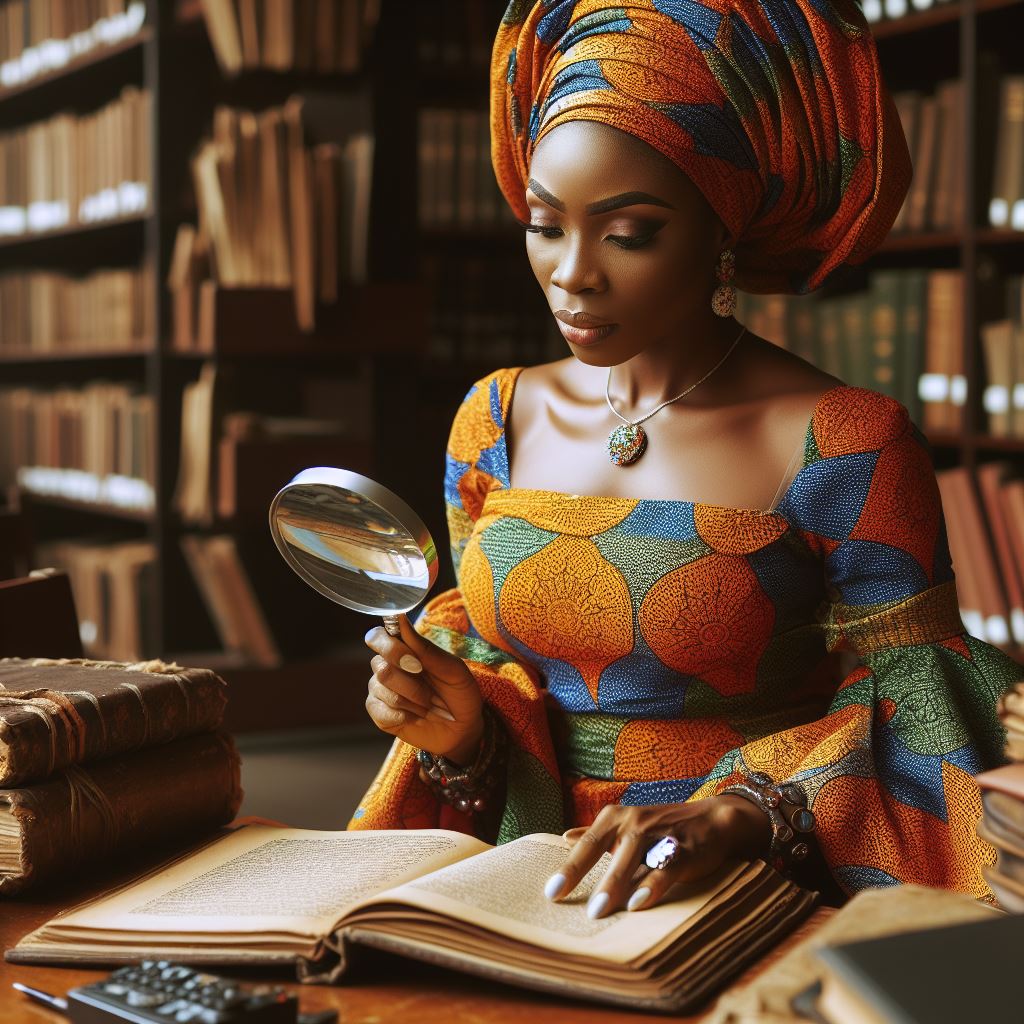Introduction
Cultural Studies in African and Asian Studies Programs play a crucial role in understanding the diverse and rich cultures of these regions.
Studying culture is important as it helps in promoting cross-cultural understanding and appreciation.
Cultural Studies enable students to delve into the historical, social, political, and economic aspects of African and Asian societies, providing a comprehensive view of these regions.
By exploring language, music, art, religion, and customs, students gain insights into the traditions and values that shape these societies.
Additionally, Cultural Studies help in challenging stereotypes and misconceptions, fostering respect for different ethnicities and traditions.
Moreover, understanding culture is vital for effective communication and interactions in a globalized world, where cultural sensitivity is essential for building relationships and partnerships.
Overall, Cultural Studies in African and Asian Studies Programs contribute to creating a more inclusive and interconnected world, where diversity is celebrated and understood.
By studying culture, students are equipped with the knowledge and skills to navigate the complexities of our multi-cultural society, promoting harmony and mutual respect among different communities.
Overview of Cultural Studies
- Cultural Studies is an academic field that explores the social, political, and economic aspects of culture.
- It examines how culture shapes and is shaped by power dynamics, identities, and historical contexts.
- Cultural Studies aims to understand how meaning is produced, shared, and contested within societies.
- This field explores a wide range of cultural artifacts, practices, and representations, from art and literature to media and popular culture.
- Cultural Studies also focuses on the intersection of culture with issues of race, gender, class, and other social divisions.
The Concept of Cultural Studies
- Cultural Studies is a multidisciplinary field that analyzes the production, distribution, and reception of cultural texts.
- It examines how power and ideology influence cultural practices and representations.
- Cultural Studies challenges conventional ideas about culture, emphasizing the importance of everyday life and popular culture.
- This field is concerned with understanding how culture shapes social relations and structures in contemporary society.
- Cultural Studies encourages critical thinking and analysis of cultural phenomena, highlighting issues of power, resistance, and social change.
The interdisciplinary nature of Cultural Studies and its relevance in academic programs
- Cultural Studies draws on insights from sociology, anthropology, history, literary theory, media studies, and other disciplines.
- Its interdisciplinary approach allows for a comprehensive understanding of culture as a dynamic and complex phenomenon.
- Cultural Studies provides students with critical thinking skills, analytical tools, and a broad knowledge base for interpreting cultural texts.
- This field encourages students to engage with diverse perspectives, challenge assumptions, and think creatively about culture and society.
- The interdisciplinary nature of Cultural Studies is essential for addressing contemporary issues, such as globalization, multiculturalism, and social inequality.
Read: Exploring Semiotics in Communication Arts
History of Cultural Studies in African and Asian Studies Programs
The Development and Growth of Cultural Studies Within Academic Programs Focused on African and Asian Regions
Cultural Studies in African and Asian studies programs have evolved significantly over the years.
This development highlights the importance of understanding diverse cultural contexts.
Initially, these programs focused primarily on historical and linguistic aspects.
However, over time, they expanded to include broader cultural dimensions.
The growth of Cultural Studies within these programs began in the mid-20th century.
Postcolonial studies emerged, emphasizing the impact of colonialism on African and Asian societies.
This shift was crucial in understanding cultural identities and histories.
In the 1960s and 1970s, key figures played pivotal roles in shaping Cultural Studies.
Frantz Fanon, a notable intellectual, analyzed the psychological effects of colonialism.
His work, “The Wretched of the Earth,” influenced many scholars in African studies.
Similarly, Edward Said’s “Orientalism” critically examined Western perceptions of Eastern cultures.
Said’s ideas significantly impacted Asian studies, challenging stereotypes and promoting a nuanced understanding.
Key Figures and Movements That Have Shaped Cultural Studies in These Programs
Movements like the African Renaissance also contributed to the growth of Cultural Studies.
This movement aimed to rediscover and celebrate African cultural heritage.
It encouraged academic programs to integrate cultural studies into their curricula.
The African Renaissance movement inspired many scholars and educators to explore African cultural expressions deeply.
In Asian studies, the Subaltern Studies group emerged in the 1980s.
This collective of South Asian scholars sought to give voice to marginalized groups.
They focused on the perspectives of those often overlooked in historical narratives.
Their work brought new dimensions to the study of Asian cultures, emphasizing the importance of grassroots perspectives.
Cultural Studies in these programs also benefitted from interdisciplinary approaches.
Scholars began incorporating methods from anthropology, sociology, and literature.
This interdisciplinary focus enriched the understanding of cultural dynamics in African and Asian regions.
It allowed for more comprehensive and holistic analyses.
Key academic institutions played significant roles in this development.
Universities like SOAS University of London and the University of Cape Town became centers of excellence.
These institutions fostered critical scholarship and promoted Cultural Studies.
They hosted influential conferences and published groundbreaking research, advancing the field significantly.
Read: Student Experiences: Life in Communication Arts
Themes and Topics in Cultural Studies
- One common theme is the examination of cultural identity and representation in African and Asian societies.
- Another theme is the analysis of power structures and social hierarchies within these cultures.
- Cultural hybridity and globalization are also important topics studied in these programs.
- Many cultural studies programs focus on the impact of colonialism and post-colonial theory on African and Asian cultures.
Examples of Specific Cultural Phenomena
- The study of traditional art forms such as African masks or Asian calligraphy is a common focus in cultural studies programs.
- Popular culture phenomena like K-pop in Korea or Nollywood films in Nigeria are often analyzed in these programs.
- Religious practices and rituals, such as Hindu festivals in India or traditional African spiritual beliefs, are also studied extensively.
- Language and literature, including the analysis of African oral traditions or Asian poetry, are important areas of focus in cultural studies programs.
Overall, cultural studies in African and Asian studies programs cover a wide range of themes and topics that contribute to a deeper understanding of the intricacies of these diverse and vibrant cultures.
By examining cultural phenomena and identity, power dynamics, globalization, and colonial legacies, students in these programs gain valuable insights into the complexities of African and Asian societies.
Through a multidisciplinary approach that incorporates art, popular culture, religion, language, and literature, cultural studies programs provide a nuanced perspective on the rich tapestry of traditions and practices in these regions.
Read: How to Apply for Communication Arts Programs

Methodologies in Cultural Studies
Different Methodologies Used in Cultural Studies to Study and Analyze Cultures in African and Asian Regions
Cultural Studies in African and Asian regions utilize various methodologies to study and analyze cultures effectively.
Each method offers unique insights into cultural dynamics.
Ethnography stands out as a prominent methodology.
Researchers immerse themselves in communities to observe and participate in daily life.
This approach provides a deep understanding of social practices and cultural norms.
Another key methodology is textual analysis.
Scholars examine literature, historical documents, and media to interpret cultural narratives.
This method reveals how cultures express themselves through language and symbolism.
Content analysis is also significant.
Researchers systematically analyze visual and textual content to identify themes and patterns.
This method is particularly useful for studying media representations and popular culture.
Interviews and oral histories play a crucial role in Cultural Studies.
By engaging directly with individuals, researchers gather personal experiences and perspectives.
These methods capture the voices and stories of those often marginalized.
Surveys and questionnaires complement interviews, providing quantitative data on cultural attitudes and behaviors.
This data helps researchers identify trends and correlations within larger populations.
Case studies offer in-depth exploration of specific cultural phenomena.
Researchers investigate particular events, communities, or cultural practices to uncover broader cultural implications.
Comparative analysis is another vital methodology.
Scholars compare cultural elements across different regions or time periods to highlight similarities and differences.
This method enhances our understanding of cultural diversity and commonalities.
The Importance of Combining Diverse Research Methods to Gain a Comprehensive Understanding of Culture
Combining diverse research methods is essential for a comprehensive understanding of culture.
Each methodology provides a distinct perspective, enriching the overall analysis.
Ethnography and interviews offer qualitative insights, revealing the human experience behind cultural practices.
These methods capture the nuances of daily life and individual perspectives.
Textual and content analysis, on the other hand, provide a broader view of cultural expressions.
They reveal how cultures construct and communicate their identities through various media.
Combining these methods allows researchers to link personal experiences with wider cultural narratives.
Surveys and quantitative methods add another layer of understanding.
They provide statistical data that helps validate qualitative findings.
This combination ensures a balanced and robust analysis.
Case studies and comparative analysis further enhance cultural research.
Case studies offer detailed insights into specific cultural contexts, while comparative analysis highlights broader cultural patterns.
Together, they provide a more holistic view of cultural dynamics.
Interdisciplinary approaches also play a crucial role.
Integrating methods from anthropology, sociology, and literature enriches Cultural Studies.
This interdisciplinary focus allows for more comprehensive and multifaceted analyses.
For example, combining ethnographic data with textual analysis can uncover how lived experiences influence cultural expressions.
Challenges and Controversies in Cultural Studies
- One challenge is understanding cultural nuances within diverse societies.
- There can be ethical dilemmas in studying cultural practices.
- Researchers must be aware of biases that can affect their work.
- Cultural appropriation is a contentious issue in Cultural Studies.
- The balance between respect for culture and academic freedom is crucial.
Addressing Challenges and Controversies
- Approach cultural studies with sensitivity and respect for diverse perspectives.
- Engage in open dialogue with communities being studied to avoid misinterpretation.
- Consider the power dynamics at play in cultural research and representation.
- Promote ethical guidelines and protocols in cultural studies programs.
- Acknowledge the complexities of culture and avoid generalizations.
Navigating Ethical Considerations
- Obtain informed consent from participants before conducting research.
- Avoid exploiting cultural practices for academic gain or sensationalism.
- Respect intellectual property rights and give credit where it’s due.
- Be transparent about methods and sources in cultural studies research.
- Reflect on your own biases and how they may influence your work.
Read: Digital Media Trends in Communication Arts
Learn More: Studying International Relations: Nigerian Student Guide
Delve into the Subject: Prominent Historical Events in Nigerian Curriculum
Impact of Cultural Studies in African and Asian Studies Programs
- The influence of Cultural Studies on education, research, and policy-making in relation to Africa and Asia.
- How Cultural Studies contributes to a deeper understanding of cultural diversity and promotes intercultural dialogue.
Cultural Studies play a crucial role in African and Asian Studies programs by influencing various aspects such as education, research, and policy-making.
These programs benefit significantly from the insights provided by the interdisciplinary field of Cultural Studies.
The influence of Cultural Studies on education, research, and policy-making in relation to Africa and Asia
One of the primary impacts of Cultural Studies in these programs is its influence on education.
By incorporating cultural perspectives into the curriculum, students gain a broader understanding of the complexities of African and Asian cultures.
This approach helps to challenge stereotypes and biases, fostering a more inclusive learning environment.
Furthermore, Cultural Studies contribute to research by providing a framework for studying cultural phenomena in Africa and Asia.
Researchers can apply diverse methodologies to explore the rich heritage and traditions of these regions.
This interdisciplinary approach enables a comprehensive analysis of social issues, historical contexts, and contemporary developments.
Moreover, Cultural Studies play a significant role in policy-making concerning Africa and Asia.
By understanding the cultural nuances of these diverse regions, policymakers can formulate more contextually relevant and effective policies.
Cultural sensitivity is essential in addressing social challenges and promoting sustainable development in these countries.
Another vital aspect of Cultural Studies is its contribution to a deeper understanding of cultural diversity.
By examining the complex interactions between different cultural groups, Cultural Studies promote intercultural dialogue and mutual respect.
This dialogue enhances global cooperation and fosters peaceful coexistence among diverse societies.
How Cultural Studies contributes to a deeper understanding of cultural diversity and promotes intercultural dialogue
Additionally, Cultural Studies provide valuable insights into the cultural heritage and traditions of Africa and Asia.
By studying the art, literature, music, and folklore of these regions, students and researchers gain a profound appreciation for the richness and diversity of African and Asian cultures.
This knowledge helps to preserve cultural identities and traditions in the face of globalization.
Lastly, Cultural Studies have a profound impact on African and Asian Studies programs, contributing to education, research, and policy-making.
By promoting intercultural dialogue and understanding cultural diversity, Cultural Studies play a vital role in shaping a more inclusive and equitable society.
Uncover the Details: How to Choose the Right Music School in Nigeria
See Related Content: Artistic Inspiration from Nigerian Landscapes
Conclusion
After discussing the significance of Cultural Studies in African and Asian Studies Programs, it is clear that these studies play a crucial role in fostering cross-cultural understanding and appreciation.
By exploring the diverse histories, traditions, and values of African and Asian cultures, students gain a deeper insight into the complexities of these regions.
From examining the impact of colonialism and imperialism to analyzing the role of globalization in shaping contemporary societies, Cultural Studies provide a comprehensive framework for studying the dynamic interactions between different cultures.
This interdisciplinary approach allows students to challenge stereotypes, break down barriers, and build bridges between diverse communities.
Moreover, Cultural Studies equip students with the essential skills to engage critically with issues of power, identity, and representation.
By encouraging dialogue and promoting cultural exchange, these programs create opportunities for individuals to develop empathy, tolerance, and respect for diverse perspectives.
Ultimately, Cultural Studies in African and Asian Studies Programs help cultivate a more inclusive and interconnected global society.
By recognizing the richness and diversity of cultural expressions, students can contribute to a more harmonious and equitable world where mutual understanding and cooperation thrive.
Therefore, it is imperative to continue integrating Cultural Studies into academic curricula to nurture a new generation of global citizens who are capable of navigating the complexities of our interconnected world with sensitivity and awareness.




